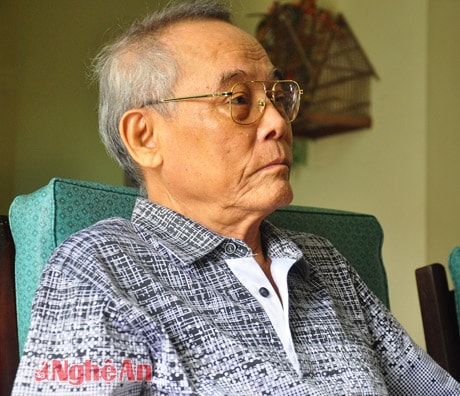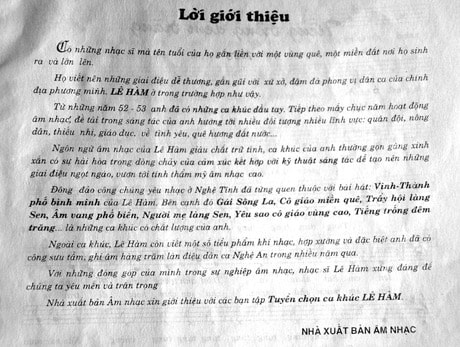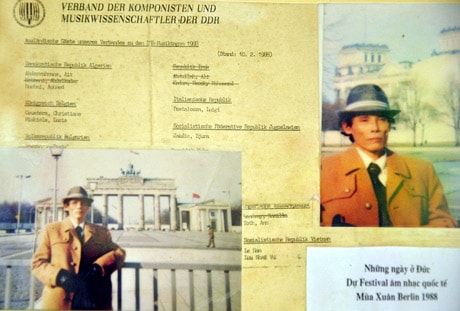The musician of "Vinh - City of Dawn"
(Baonghean) - He came to the door to welcome us with a bright smile. The sun was shining on the bushes on the second floor balcony after several days of rain and flooding, where we followed him to sit in the quiet space in the middle of a noisy city, listening to him open his heart about music, about life and about... Vinh. And his singing voice, his singing voice flew out from his chest that was starting to get old, still passionately expressing his overwhelming love for this life. He is musician Le Ham, author of the song "Vinh - City of Dawn".
(Baonghean) - He came to the door to welcome us with a bright smile. The sun was shining on the bushes on the second floor balcony after several days of rain and flooding, where we followed him to sit in the quiet space in the middle of a noisy city, listening to him open his heart about music, about life and about... Vinh. And his singing voice, his singing voice flew out from his chest that was starting to get old, still passionately expressing his overwhelming love for this life. He is musician Le Ham, author of the song "Vinh - City of Dawn".
 |
Passion for melodies
The singing voice of an old man who has reached the age of 80, gone through many ups and downs, yet still has the same passion. Is it true that in that chest, is still the heart of a 7-year-old boy, in the small hamlet of Dien Hong commune (Dien Chau) who knew how to sob when hearing his mother play Kieu, who eagerly stood still for hours listening to the sounds and melodies played on the makeshift stage of the hamlet's art troupe, who knew how to make a small flute for himself from... a papaya leaf stem and refused to let go of his flute all day?
The boy Le Ham at that time grew up with such a passion for melody, until he entered the Military Academy in 1948-1951, when he was able to study music in a more systematic way. His first music teacher, whom he was grateful for all his life, was musician Pham Suu. With his "outstanding talent for playing the flute", as he said, he was determined to pursue a "musical path", becoming an artist of the 320th Division. In 1955-1961, he studied at the Vietnam Music School. He remembers that his graduation song was a 6-movement choir, when he heard it play, he felt his heart skip a beat because he seemed to "feel himself touching his childhood dream". After graduating, he was assigned to the Vinh Linh border, doing cultural work, specifically music to serve our soldiers on the northern bank of the Ben Hai River. Those days gave him the real experience of “another war”, and he deeply realized the magical power of music. Between the two sides of the front line, between guns and brutality, what moved people was sometimes simply a melody. After a period of time in Vinh Linh, in 1964, Le Ham was assigned to be a teacher at the Central Music and Art School, but with the invitation of the Head of the Ha Tinh Performing Arts Troupe, Le Ham decided to “return to Nghe”. He said, he missed home, missed his hometown, Ha Tinh coming home to him was also close...
He returned to Ha Tinh during the fiercest years of the war against the US, conducting the orchestra of the Ha Tinh People's Art Troupe. During that time and even later, when the Troupe split in 1970, he returned to be the Head of the Ha Tinh Song and Dance Troupe, a time full of hardships but also very heroic. He and the Troupe performed at artillery positions, battlefields where the gunfire had just stopped. There were songs that were sung but were cut off by the sound of falling bombs. It was during those days that many emotions were nurtured in him, one could say they were "ultimate emotions". Ultimate love, ultimate anger, ultimate pride, pride... Such as "Glorious Ha Tinh Victory", "Ferry Soldiers", "La River Girls"... were born from such emotions.
In 1968, the song “Gải Sông La” imbued with the folk song of Lê Hàm resounded on the Voice of Vietnam, not only many people shed tears but the author himself also... cried. He cried because his heartfelt words once again brought back to him familiar and touching images: An entire homeland, an entire nation facing the battlefield, placing all their faith in the day of victory. Everyone wanted to contribute their strength to fight the Americans. Those who left did not regret their lives, but those who stayed behind also sacrificed even a piece of their own coffin to make a road for the vehicle to pass. His song mentioned the girls who “secretly went to clear the road”... His word “secretly” is so loving and precious! The image of a woman from Nghe An is so beautiful and brave! To admire and be proud: “In the Soviet Union, the girls are not inferior to the boys”.
He recalled a sad memory of a time when the group performed in Huong Phuc, Huong Khe (Ha Tinh). The group arrived when the school there had just been bombed. Before his eyes, the devastation, the sight of books and clothes still mixed in mud, or thrown into the air, made the musician's heart ache. He could not stop writing the song "Let's avenge the children" with a melody filled with indignation... "Back then, the songs were not paid royalties like now, but we wrote and sang with all our hearts" - he said. During those years, he was also passionate about field trips and collected many folk songs of Nghe An, so that later he would be the editor of the book "Folk music of Nghe An" which was highly appreciated by the music world.
Fate and debt with Vinh
It was not until 1976, after the merger, when Le Ham became the Head of the Nghe Tinh Song and Dance Troupe, that he became attached to and loved the city, which inspired him to write a "lifetime" song. Vinh, in the memory of a country boy, in the old years, followed his mother's hard-working wholesale cloth stall in the alley of Cua Ta, Vinh city. That boy stood still watching the soldiers in green and red uniforms marching in unison to the sound of trumpets, leaving. That boy also curiously looked at the puffing locomotives, the heavy train cars right at Vinh Station on Quang Trung Street now, and he knew that not far away, his older brother was studying at Vinh National School but dared to stand up with many other progressive youths to protest against the Governor General. Vinh was also a familiar road, he passed by to return to his hometown during the years working in Ha Tinh. His feet were attached to the roads, which were then narrow and bare of wild trees, with thatched roofs, with red streetlights, with the quiet ruins of the war years. “The place I sit now, used to be a field, a garden…”- he pondered, his eyes were far away, looking out at the balcony filled with new sunlight, then continued the story leading to his song about the “city of dawn”.
 |
 |
| Memories of attending an international music festival in Berlin (Germany). Photo: Tran Hai |
In 1979, after returning from a training course in Hanoi with the Delegation, he saw a devastated, ruined Vinh. And the small people standing on the ruins to embark on the huge mountain of work: rebuilding the beloved City. Emotions suddenly flooded back. From his childhood, from the gaze of a country boy, from the brass trumpets of soldiers in green and red trousers, from many hardships, wars and storms, and, most personally, a story, an emotion that still haunted him... It was a moonlit night during the fierce war years, when he cycled from Ha Tinh to Vinh, and met a young female Youth Volunteer at a pontoon bridge along the way. She asked for a ride: "Where are you going? Are you going to Vinh, my hometown?". He nodded. Sitting behind her, she chattered on and on about her hometown and asked him questions. Until passing Ben Thuy, she stopped to turn into the road to her house, then said: "Hello, remember tomorrow I will pick you up to go back to Thanh Vinh". That private memory with that warm greeting helped him create the first melody of his famous song: "I will pick you up to go back to Thanh Vinh, my hometown/ Listen to the sea breeze lull the Lam River gently/ Relatives and friends live happily together in love/ Here are the city's construction sites at dawn/ The affectionate song of a girl from Vinh...".
Someone asked him, Vinh still has many hardships, many heroes, why don't you "tell more" in your song? Le Ham said: "I have carefully chosen my words. Writing about Vinh's hardships, I have summarized them in there: "Through many storms and fires, Vinh is still loyal". In there are wars, bullets, Lao wind, storms, droughts... Is it necessary to tell them all? I want to convey in there the love of Vinh people. That love is very deep... Then he explained, why is it "The moon hangs on the top of Quyet mountain, the moon is clear"? That is because Vinh is the land of Lao wind and burning sand, he did not use the image of the sun but used the image of the moon to soften and cool it. "Luckily Vinh has Quyet mountain" - he smiled and added - "all the bright, beautiful, clear dreams in life (like the moon for example) without determination, can they be clear, beautiful forever, can they be achieved?" As for why it is called “City of Dawn”, this is not too difficult to explain, right? Vinh is a young city, a city under construction, that dawn is the beginning of a new journey, hopefully Vinh will also rise as brightly as the dawn...”.
And, his love for Vinh is not only in "Vinh - City of Dawn", he also has many songs about Vinh such as "From the Red City we set out", "Loved Vinh City"... He also has the merit of collecting folk songs in this land, typically "Ho lo Dong Vinh". Vinh, to him, is also the place where his warm home was built with the sweat and effort of his whole family, the place where he met his artistic friends, the place where he could sing, the place where he lit the lamp to write music every night. The place where he realized that Vinh, despite its hardship, still had a charming charm, Vinh people were intelligent and full of affection. And he could walk on the street to see Vinh change every day...
More than 200 songs, from children's songs that have been selected for music textbooks, to suites for choirs..., but for him "having a song anchored in people's souls, sung by people every day, is the boundless happiness of a musician". Even luckier, "Vinh - Dawn City" is considered a "Vinh song", chosen as the theme song of the Radio, of many major art programs, that is a precious reward for someone who loves Vinh. "And so, I am still indebted to Vinh" - he said.
Conclusion
Let me end our meeting with the musician with the diary entries a journalist colleague posted on his Facebook, which also speak for our feelings:
“I went to work early this morning. It was a little chilly. I turned on the radio and saw a program talking about a song by musician Le Ham: Vinh - City of Dawn!
What a great song! The commentary is also very good! The endless constructions and reconstructions after the war's collapse... In a slow and passionate 3/4 rhythm, the young man invites the girl to return to his hometown Vinh City. Return to witness the miraculous changes of the welding lights that stay awake every night on the upper floors; the hardships and growth; return to love even more the affection of Nghe An... Dawn on the Red City, a very romantic suggestive image. In the chilly morning, driving slowly on the road, looking at the clean city and the bustling crowd, suddenly feeling strangely peaceful!
After a lot of effort, I have become a citizen of this city. And later, this will be my children’s hometown… I wonder, do I love this city?
I love it! I love the peeling sidewalks; the endless roads covered in summer sun and battered by winter winds. I love the hesitations, the tiredness and stumbles of a reckless time gone by… I love the dark moments when the father and son of the beggar dreamily on the sidewalk; I love the flashy lights of the skyscrapers.
That's it! My life is so busy and hard to make a living! But I realize, very honestly, I love this city and this life! Don't believe it? One morning, wake up really early, open all the doors, turn on the radio, listen to the song "Vinh - City of Dawn" by musician Le Ham again, I bet your restless heart will start to beat! (Nguyen Anh Tuan)
Thuy Vinh






